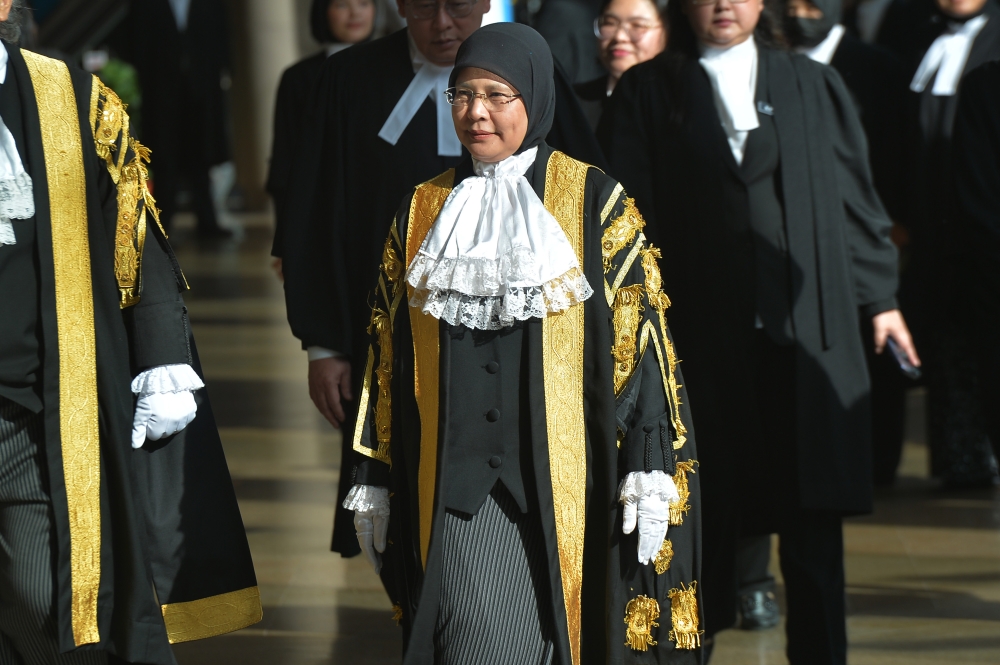Chief Justice Tengku Maimun on being Malaysia’s first female top judge, and more
1 天前
KUALA LUMPUR, July 2 — Kelantan-born Tun Tengku Maimun Tuan Mat ended her six-year tenure yesterday after having served as Chief Justice (CJ) of Malaysia from May 2019 until now.
She steered the judiciary through multiple challenges such as the Covid-19 pandemic, attacks against judges carrying out their duties in high-profile cases and criminal trials involving politicians, and also brought about many reforms with new digital systems to modernise the courts and boost efficiency.
Here are some highlights of Tengku Maimun’s time as CJ, in her own words based on her past speeches:
On why she isn’t the Chief Justice because she is a woman
Tengku Maimun on May 2, 2019 broke the glass ceiling as the first woman to be made CJ in Malaysia.
In October 2019, she quoted the UK’s first female prime minister, the late Baroness Margaret Thatcher, as saying: “I cannot tell you how being the first woman Prime Minister feels because I have never been a male Prime Minister”.
In August 2023, Tengku Maimun said gender equality includes not over-emphasising someone’s achievement because they are women, including her being made the first female CJ which she believes was “based purely on my qualifications and not because of my gender.”
‘[We] do not decide cases based on popular public views...’
Tengku Maimun has repeatedly fended off threats to judicial independence by defending judges from intimidation and mudslinging campaigns.
In July 2020, she noted that judges’ decisions in cases involving politicians would be viewed from a political perspective, no matter how impartial or how detached the judges are from politics.
She said judges must be prepared to face scrutiny and to “swallow the hurtful, unfair and baseless allegations” against them if their decisions do not match public opinion, saying: “But let it be known that we do not decide cases based on popular public views, rather, we decide cases based on the evidence and the law.”
In January 2023, she condemned attempts to intimidate and pressure judges over public interest cases: “It is very mischievous for anyone to try to tarnish the image of the courts and bring it into disrepute through unfair, biased and often times unenlightened criticism simply because they happen to not like particular decisions.
‘The courts cannot turn around and insist to the public prosecutor that a charge remains’
Tengku Maimun said when the Attorney General (AG), as the public prosecutor, decides to drop charges, the courts only have two choices under Malaysia’s laws — to either grant a DNAA or acquit the accused person.
A DNAA means the person can be brought back to court to face the same charges in the future, while an acquittal means they cannot be charged on the same charges again.
Tengku Maimun in July 2020 said the courts have no power to force the AG to continue the trial when the AG has decided to drop the charges, reiterating in 2024: “The courts cannot turn around and insist to the public prosecutor that a charge remains.”
‘I have been criticised, vilified, been labelled un-Islamic or an enemy of Islam’
“As Chief Justice, I have been criticised, vilified, been labelled un-Islamic or an enemy of Islam, my husband (unfairly so) has been used against me in some applications to not only have me recused but more generally, to embarrass me and my colleagues,” Tengku Maimun said this year, but said her conscience remains clear.
Tengku Maimun cited several Federal Court decisions in recent years which she said were not about the religion of Islam, but were instead about the constitutional issue of whether state legislatures or Parliament had the power to make certain criminal laws.
“That is all it was. Yet, you would invariably have seen that some parties spun those decisions to appear as if the judiciary or some judges within it, including me, are anti-Islam. Some even questioned my faith as a Muslim,” she said.
On how the judiciary’s loyalty lies with the law
Tengku Maimun said the judiciary’s top four judges including herself give out administrative directions to other judges, but noted this is only to ensure efficient management of court cases.
She said the top four judges do not interfere and cannot give orders to other judges on how to decide cases.
“At this juncture, I would like to share my reminder to the Malaysian judges that the top judges are only the first among the equals and that judges are not expected to display their loyalty to these ‘bosses’ but only to the law,” she said in March 2023, reiterating the same message she had given in November 2019.
On not being partial to any particular prime minister or any political party
Early this year, Tengku Maimun said she looked forward to her retirement, as she believes she is leaving the judiciary in a better spot than before, and as she would get to spend more time with her grandchildren.
Noting that she had served as CJ under four different prime ministers who all have different political affiliations, she said panels of judges led by her “have made what we believed to be correct decisions on the law and facts” despite the heated political overtones and undertones in these cases.
“This alone should dispel any baseless notion that I have ever been partial to any particular prime minister or any political party,” she said.
...Read the fullstory
It's better on the More. News app
✅ It’s fast
✅ It’s easy to use
✅ It’s free









